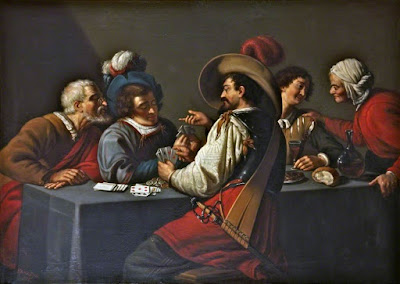Drug Companies, Books - Empire of Pain - Patrick Radden Keefe, Letter
Drug Companies
 |
| The Cheat Edgard Farasyn (1858-1938) Photo Credit: Walker Art Gallery [CC BY-NC] |
The competition watchdog has provisionally ruled that Advanz Pharma and Morningside reached a deal with the wholesaler Alliance Healthcare so that they would not compete in the market for nitrofurantoin capsules between 2014 and 2017. The medicine, for urinary tract infections, underwent a five-fold price increase in this time.
…During this period the price to the NHS of the 50mg version of the medicine rose from £3.66 in early 2014 to £15.42 at the end of 2016, and a packet of 100mg capsules went from £6.91 to £10.42.
…It is the latest case conducted by the regulator where it has accused drug companies of breaking competition law by striking deals or abusing a dominant market position to sustain or raise prices.
…The government passed legislation in 2017 that enables it to step in and impose lower prices for medicines if it believes it is being overcharged but ministers have not yet used these powers.
…The companies said they did not believe they had broken competition law and would examine the CMA’s [The Competition and Markets Authority] findings. They will have an opportunity to respond but could face fines of 10 per cent of their global revenue.
(The Times, 2019)
Empire of Pain
It tells the story of the Sackler family, whose firm, Purdue Pharma, created and aggressively marketed the painkiller OxyContin that fuelled the opioid crisis. In the US opioid addiction has killed 500,000, more than died in all the wars the country has fought since 1945, and cost the country some $80 billion a year and counting in healthcare and other costs...
There's so much greed and venality that it is hard to know where to begin, but a good place is the end... Keefe shows that the Connecticut-based Purdue conspired to sell billions of dollars worth a year of a drug they knew was highly addictive and was killing many who took it. He describes how they influenced regulators; funded naive or unscrupulous researchers and academics to declare OxyContin safe; used aggressive, sometimes fraudulent sales tactics; and co-opted doctors by wining and dining them, running up $9 million a year in restaurant bills...
They lied about what they knew about the risks of the drug and used their legal muscle to squelch court cases, spending, at times, $43 million a month on lawyers.
All the while they used philanthropy to distract from their misdeeds, making large donations, in return for naming rights and tax write-offs, to the Metropolitan Museum of Art and The Tate, to name just two. They got away with it for decades...
To persuade doctors to prescribe OxyContin and patients to start using it, Purdue offered both free 30-day subscriptions, even though it knew that some users might become addicts after taking just a few tablets, After it became clear that sales of a hugely powerful 80mg tablet were soaring, partly due to abuse, Purdue's response was to propose a 160mg tablet so strong a single pill could kill...
The Sacklers turned a blind eye to the existence of "pill farms" run by greedy doctors who were hugely over-prescribing OxyContin, much of which made it onto the black market. When the damage OxyContin was doing became clear, the Sacklers initial reaction was not to try to repair it, but rather develop new drugs to treat the addicts they had created and make even more money...
Keefe reports how they moved most of the tens of billions of dollars they made from Purdue to hard-to-trace overseas trusts that it would take prosecutors years to identify. The fine they had to pay for violating US laws in the end was just $225 million. That works out as $450 for every life lost so far. None of the family faces criminal charges.
(Michael Sheridan, The Sunday Times, 2021)
Letter
Sir, I have been vaccinating since January and our locality has now reached the thirtysomething cohort.
Yesterday my colleagues and I were struck by the number of very anxious and "needle-phobic" individuals, and witnessed refusals, tears, panic attacks and faintings, etc.
We concluded that this represents a generation of uber-anxious individuals or that there is an increasing fragility to the human psyche. It's a worrying trend because this group will be the leaders of the country in ten to 20 years' time.
(Dr Andrew Cairns, Ret'd GP; Liss, Hants. The Times, 2021)
What an interesting observation. Is this being replicated all over the UK?
Comments
Post a Comment